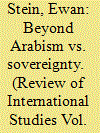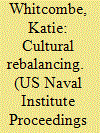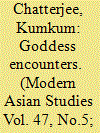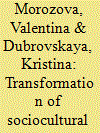| Srl | Item |
| 1 |
ID:
117205


|
|
|
|
|
| Publication |
2012.
|
| Summary/Abstract |
This article critiques constructivist approaches to the international relations of the Middle East and sets out an alternative interpretation of the role of ideas based on political economy and the sociology of knowledge. It cautions against using constructivism as a way of 'building bridges' between IR and Middle East Studies and disputes the claim that the norms of 'Arabism' as a putative regional identity are in contradiction with those of sovereignty. The article shows that this assumption is based on the combined influences of modernisation theory and Orientalist assumptions about the power and continuity of regional culture that have persisted in Middle East IR. This is despite the fact that there is no reason to believe the Arabs constitute a more 'natural' nation than do the Syrians, Iraqis or Egyptians. The political role and resonance of ideas can be better established by viewing the modern history of the Middle East in terms of domestic structure and social change, and in particular emphasising the role of rising middle classes in revolutionary nationalist movements. The findings of this article raise questions for the utility of 'moderate' constructivist interpretations of International Relations as a whole.
|
|
|
|
|
|
|
|
|
|
|
|
|
|
|
|
| 2 |
ID:
130497


|
|
|
| 3 |
ID:
126135


|
|
|
|
|
| Publication |
2013.
|
| Summary/Abstract |
This paper makes a case for exploring the cultural facets of Mughal rule as well as for a stronger engagement with sources in vernacular languages for the writing of Mughal history. Bengal's regional tradition of goddess worship is used to explore the cultural dimensions of Mughal rule in that region as well as the idioms in which Bengali regional perceptions of Mughal rule were articulated. Mangalkavya narratives-a quintessentially Bengali literary genre-are studied to highlight shifting perceptions of the Mughals from the late sixteenth century to the eighteenth century. During the period of the Mughal conquest of Bengal, the imperial military machine was represented as a monster whom the goddess Chandi, symbolizing Bengal's regional culture, had to vanquish. By the eighteenth century, when their rule had become much more regularized, the Mughals were depicted as recognizing aspects of Bengal's regional culture by capitulating in the end to the goddess and becoming her devotees. This paper also studies the relationship of the Mughal regime with Bengal's popular cultural celebration-the annual Durga puja-and explores its implications for the public performance of religion and for community formation during the early modern period.
|
|
|
|
|
|
|
|
|
|
|
|
|
|
|
|
| 4 |
ID:
164063


|
|
|
|
|
| Summary/Abstract |
This article analyzes the process of transformation in the frontier sociocultural spaces of Russia and China on the example of the regional pair Trans-Baikal Territory of Russia - Northeast China (Dongbei). The authors describe their functioning in three dimensions - local, national, and foreign cultural. In this context, it seems relevant to address the special practice of developing frontier areas, which today are not only an outpost, but also a place of active interaction of countries, cultures, and civilizations.
|
|
|
|
|
|
|
|
|
|
|
|
|
|
|
|